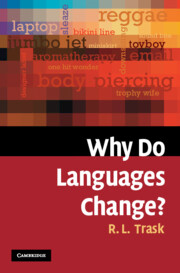Book contents
- Frontmatter
- Contents
- List of figures and tables
- A few words before we start
- Acknowledgements
- 1 How do languages change?
- 2 Why are languages always changing?
- 3 Where do words come from?
- 4 Skunk-Leek – my kind of town: what's in a name?
- 5 Where does English come from?
- 6 Why is American English different from British English?
- 7 Why is English spelling so eccentric?
- 8 Which is the oldest language?
- Some final thoughts
- Further reading
- Index
8 - Which is the oldest language?
Published online by Cambridge University Press: 05 June 2012
- Frontmatter
- Contents
- List of figures and tables
- A few words before we start
- Acknowledgements
- 1 How do languages change?
- 2 Why are languages always changing?
- 3 Where do words come from?
- 4 Skunk-Leek – my kind of town: what's in a name?
- 5 Where does English come from?
- 6 Why is American English different from British English?
- 7 Why is English spelling so eccentric?
- 8 Which is the oldest language?
- Some final thoughts
- Further reading
- Index
Summary
A common question
I belong to the panel of an Internet service which offers to answer questions on language and languages. One of the questions we receive most often is: ‘Which is the oldest language?’ Sometimes we get variations on this theme. ‘Is Hebrew the oldest language?’ ‘Is Sanskrit the oldest language?’ ‘Is French older than English?’ ‘Is it true that Basque is the oldest language in Europe?’ Clearly there is a great deal of interest in these matters. But it is actually very difficult to find this answered in a clear but scholarly way. In this chapter I'll try to do so. But let's begin with another question, one which is just about as basic as anything can be in the study of languages.
Where do languages come from?
We need to ask this question in order to talk about the ages of languages. You have a mother tongue, which you learned in early childhood. That mother tongue may be English, or it may be something else: this makes no difference. Where did you get your mother tongue from?
Very likely you don't remember all that much about the early stages of acquiring your first language, but fortunately a considerable number of linguists have studied children learning their mother tongues, and we now know a great deal about what happens. The answer is not very surprising: you learn your first language from people who already know it, or who at least know a little more than you.
- Type
- Chapter
- Information
- Why Do Languages Change? , pp. 154 - 184Publisher: Cambridge University PressPrint publication year: 2009



